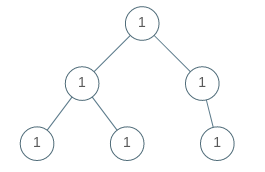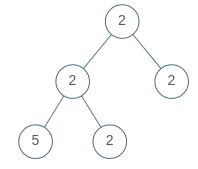Welcome to Subscribe On Youtube
965. Univalued Binary Tree
Description
A binary tree is uni-valued if every node in the tree has the same value.
Given the root of a binary tree, return true if the given tree is uni-valued, or false otherwise.
Example 1:

Input: root = [1,1,1,1,1,null,1] Output: true
Example 2:

Input: root = [2,2,2,5,2] Output: false
Constraints:
- The number of nodes in the tree is in the range
[1, 100]. 0 <= Node.val < 100
Solutions
-
/** * Definition for a binary tree node. * public class TreeNode { * int val; * TreeNode left; * TreeNode right; * TreeNode() {} * TreeNode(int val) { this.val = val; } * TreeNode(int val, TreeNode left, TreeNode right) { * this.val = val; * this.left = left; * this.right = right; * } * } */ class Solution { public boolean isUnivalTree(TreeNode root) { return dfs(root, root.val); } private boolean dfs(TreeNode root, int val) { if (root == null) { return true; } return root.val == val && dfs(root.left, val) && dfs(root.right, val); } } -
/** * Definition for a binary tree node. * struct TreeNode { * int val; * TreeNode *left; * TreeNode *right; * TreeNode() : val(0), left(nullptr), right(nullptr) {} * TreeNode(int x) : val(x), left(nullptr), right(nullptr) {} * TreeNode(int x, TreeNode *left, TreeNode *right) : val(x), left(left), right(right) {} * }; */ class Solution { public: bool isUnivalTree(TreeNode* root) { return dfs(root, root->val); } bool dfs(TreeNode* root, int val) { if (!root) return true; return root->val == val && dfs(root->left, val) && dfs(root->right, val); } }; -
# Definition for a binary tree node. # class TreeNode: # def __init__(self, val=0, left=None, right=None): # self.val = val # self.left = left # self.right = right class Solution: def isUnivalTree(self, root: TreeNode) -> bool: def dfs(node): if node is None: return True return node.val == root.val and dfs(node.left) and dfs(node.right) return dfs(root) -
/** * Definition for a binary tree node. * type TreeNode struct { * Val int * Left *TreeNode * Right *TreeNode * } */ func isUnivalTree(root *TreeNode) bool { var dfs func(*TreeNode) bool dfs = func(node *TreeNode) bool { if node == nil { return true } return node.Val == root.Val && dfs(node.Left) && dfs(node.Right) } return dfs(root) } -
/** * Definition for a binary tree node. * class TreeNode { * val: number * left: TreeNode | null * right: TreeNode | null * constructor(val?: number, left?: TreeNode | null, right?: TreeNode | null) { * this.val = (val===undefined ? 0 : val) * this.left = (left===undefined ? null : left) * this.right = (right===undefined ? null : right) * } * } */ function isUnivalTree(root: TreeNode | null): boolean { const val = root.val; const dfs = (root: TreeNode | null) => { if (root == null) { return true; } return root.val === val && dfs(root.left) && dfs(root.right); }; return dfs(root.left) && dfs(root.right); } -
// Definition for a binary tree node. // #[derive(Debug, PartialEq, Eq)] // pub struct TreeNode { // pub val: i32, // pub left: Option<Rc<RefCell<TreeNode>>>, // pub right: Option<Rc<RefCell<TreeNode>>>, // } // // impl TreeNode { // #[inline] // pub fn new(val: i32) -> Self { // TreeNode { // val, // left: None, // right: None // } // } // } use std::rc::Rc; use std::cell::RefCell; impl Solution { fn dfs(val: i32, root: &Option<Rc<RefCell<TreeNode>>>) -> bool { if root.is_none() { return true; } let root = root.as_ref().unwrap().borrow(); root.val == val && Self::dfs(val, &root.left) && Self::dfs(val, &root.right) } pub fn is_unival_tree(root: Option<Rc<RefCell<TreeNode>>>) -> bool { let root = root.as_ref().unwrap().borrow(); Self::dfs(root.val, &root.left) && Self::dfs(root.val, &root.right) } }